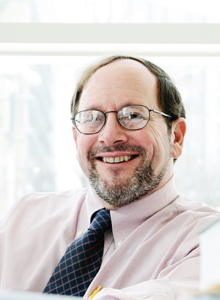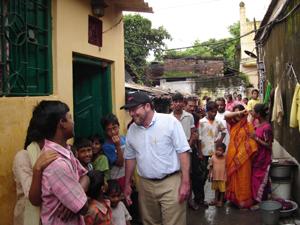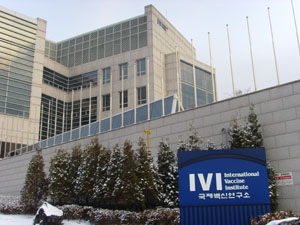"Keep Dreaming of a Better World "
Dr. John Clemens
The Director-Ceneral of the International Vaccine Institute
By Kang Yeon-ah, Guest Reporter
As a spring breeze wakes up our CNU campus, a new semester has just begun. This year, Chonnam Tribune has a special section called "People" which is to interview a person who works for the poor and powerless internationally. When I was searching for a suitable person, Dr. John Clemens, an old friend of Dr. Ok Pannenborg whom I met in Washington D.C. back in 2007, suddenly came across my mind.
As an international expert on the evaluation of vaccines and epidemiology, Dr. John Clemens is now the Director of the International Vaccine Institute (IVI) located in the Research Park of Seoul National University. The IVI is the only legally constituted international vaccine research organization aimed to improve poor health conditions in the developing world by studying and conducting research on effective vaccines.
Decisive Experience in Bangladesh 
He started to talk about his experience in Bangladesh where he met Dr. Ok Panenborg and studied both measles and a cholera vaccine. After post-doctoral training, from 1983 to 1988, he was a vaccine researcher and faculty member at the International Centre for Diahorreal Diseases in Bangladesh, where he witnessed the poor and powerless, who could not have any access to health care. They were vulnerable to various infectious diseases, or worse, like typhoid fever, which is known to be treatable but could be a life threatening disease in Bangladesh due to poor infrastructure. He said this five-year experience meant a lot to him; his determination, which was to help others by researching a new vaccine that could effectively save many lives, was confirmed.
He has a doctors’ family background; his grand parents were doctors, and his great-grand father was Abraham Lincoln’s physician. He said that it was so natural to want to be a doctor when he was young. Asked who his role model was, he answered that it was Jonas Salk without hesitation. Jonas Salk was a professor at the University of Pittsburgh. During the 1950s, he developed, tested and refined the first successful virus-killing polio vaccine, using inactive poliovirus cells injected into the body. At that time, polio was a prevalent and severe disease in U.S; this invention was sensational and lead to dramatic results. His work inspired Dr. John Clemens, who was a young boy at that time, and he realized that researching new vaccines is important as well as patient care.
Passion for the IVI
I think the only way to get out of poverty and reducing the health care gap between the developing and the developed countries is to make a strong long term public medical policy, to assure equal chance to be healthy, rather than having to resort to individual clinical treatments. I wondered how much the IVI contributes to this point, and he said that the IVI gives rational evidence like how effective the vaccine is, how feasible a vaccine plan is to the government, also the IVI does economic
analysis. He said that the IVI informs policy not influences policy. It means that the IVI respects the developing countries' government with a neutral view in terms of giving diverse research data to help make a correct decision.
His passion for the IVI is beyond my imagination. I thought he might feel frustrated when he had to raise funds, however, he said, "There are many challenges, not difficulties in my work." He said that he loves what he does and every moment is full of excitement. Through his hard work, he met many generous donors including Bill & Mellinda Gates Foundation, Giving Club, and a Korean famous celebrity, Jung Jun-ho. He especially appreciated the Korean Government for its continuous support.
Pursue an Ideal in Your Own Way
My last question was what he would want to do if he went back to his 20s. He seemed to be interested and answered smiling, “Definitely, Peace Corps!” When he graduated from high school, many of his friends joined Peace Corps and went to various underdeveloped countries. He, however, went straight ahead to college. After he got in college, he decided to take one year off and went to Tanzania by himself. They were so poor and literally un-developed. At that time, the Tanzanian government made collective farms; they forced people to move around, which caused many infectious diseases to become prevalent. He thought the power of pubic health was desperately needed.
The interview lasted almost an hour and he gave me a tour of the IVI Center. As the interview concluded, he cried, “Don't lose your idealism!” He taught me that the most important thing, however, is not to obsess over money or fame but to live a fulfilling life. I will say this interview was the highlight of this winter vacation; his vision inspired me to continue to pursue my dream.
<International Vaccine Institute (IVI)>
The IVI is an International Organization established as an initiative of the United Nations Development Programme under the Vienna Convention of 1969 with the signatures so far of 40 countries and the World Health Organization. It is governed by an independent Board of Trustees and is located in Seoul, Korea. Korea serves both as the Host Country and also as a generous supporter of the IVI.
The IVI is an international center of research, training and technical assistance for vaccines needed in developing countries. It has various translational research programs, which include diseases of the Most
The DOMI Program is an eight-year effort funded with a grant of $40 million by the Bill and Melinda Gates Foundation. DOMI addresses the need for research and development of vaccines against three important enteric diseases - cholera, shigellosis, and typhoid fever - that collectively account for hundreds of thousands of deaths each year, largely among children.

